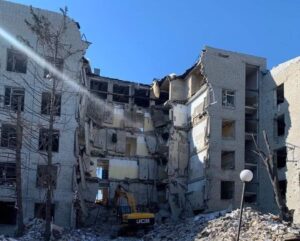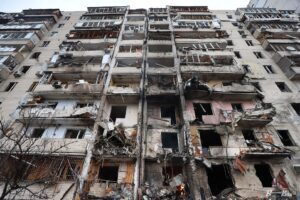
As of April 11, 2022, the KSE Institute estimated damage to Ukraine’s infrastructure from the war in the country at $80.4 billion, or UAH 2.4 trillion, while over the past week, the estimate of losses increased by $12.2 billion, according to a press release. analytical division of the Kiev School of Economics (KSE) KSE Institute.
“Over the past week, direct losses to the Ukrainian economy due to destruction and damage to civilian and military infrastructure, documented in public sources, have increased by $12.2 billion. As of April 11, the total amount of direct documented damage to infrastructure, based on public sources alone, has already reached $80.4 billion, or UAH 2.4 trillion,” the KSE Institute said, referring to data analysis within the framework of the Russia will pay project.
Most of all, the growth in the cost of infrastructure damage increased over the past week due to the destruction of residential real estate, including due to clarifications of previous destructions, analysts said. Also, the assessment of the damage caused by the loss of assets of enterprises has also increased.
In general, according to the general estimates of the Ministry of Economy and KSE, the losses of the economy due to the war, taking into account the direct losses calculated in this project, as well as indirect losses, such as a decrease in GDP, a halt in investment and an outflow of labor, range from $564 billion to $600 billion .
According to the release, during the 47 days of Russian aggression in Ukraine, at least 23,000 km of roads, 37,000 sq. m of housing stock, 319 kindergartens, 546 educational institutions, 205 medical institutions, 145 factories and enterprises. In addition, at least 54 administrative buildings, 277 bridges and bridge crossings, 10 military airfields, eight airports and two ports were damaged during the war. Also as of April 8, at least 74 religious buildings and 62 other cultural buildings have been damaged, destroyed or seized.
As reported, the Office of the President, the Ministry of Economics and the analytical center at the Kiev School of Economics KSE Institute launched the project “Russia will pay” – a portal to collect information about the destroyed objects in the country as a result of Russia’s full-scale war against Ukraine.
On a special website https://damaged.in.ua/ you can provide information about the damage caused as a result of the war against Ukraine. In the future, this information will be used by the Ukrainian government as evidence in international courts to compensate Russia for the damage caused.

As of April 1, 2022, the KSE Institute estimated the damage to Ukraine’s infrastructure from the war in the country at $68.2 billion, or almost UAH 2 trillion, while over the past week the estimate of losses increased by $5 billion, according to a press release of the analytical division of the Kyiv School of Economics (KSE), KSE Institute.
“Over the week, the damage caused to Ukraine’s infrastructure during the war waged by Russia has increased by more than $5 billion. As of April 1, the total amount of damages is $68.2 billion,” the KSE said, referring to the Russia Will Pay project.
“Since the beginning of Russia’s military aggression on February 24, at least 533 institutions of secondary and higher education, 300 kindergartens, 196 healthcare institutions, 129 factories/warehouses are destroyed or damaged. The Ministry for Communities and Territories Development estimates that 6,800 residential buildings were damaged or destroyed. According to the KSE Institute, the total amount of damaged/destroyed residential real estate is about 26 million square meters,” the report says.
“In addition, 54 administration buildings, 260 bridges and bridge crossings, 10 military airfields, 8 airports, 2 ports were damaged by the war. During full-scale Russia’s invasion, the occupiers caused damage to Ukraine, destroying or damaging 64 religious buildings and 51 cultural objects,” it reads.
As reported, the Office of the President, the Ministry of Economy and the analytical center at the Kyiv School of Economics, KSE Institute, launched the Russia Will Pay project, a portal to collect information about the destroyed objects in the country as a result of Russia’s full-scale war against Ukraine.
On the special website https://damaged.in.ua/ you can provide information about the damage caused as a result of the war against Ukraine. In the future, this information will be used by the Ukrainian government as evidence in international courts for compensation by Russia for the damage caused.

As of March 24, 2022, the KSE Institute estimated damage to Ukraine’s infrastructure from the war in the country at $62.9 billion, or UAH 1.8 trillion, while its analysts increased the amount by $3.5 billion over the past week, according to a press release. release of the analytical division of the Kiev School of Economics KSE Institute.
“Compared to the data released on March 17, taking into account the new received more accurate data on damage (as a result of which certain items of losses were revised downward), the net increase (in damages) was $ 3.5 billion,” according to the KSE Institute. on Friday, citing data analysis from the Russia Will Pay project.
Analysts estimate that since the beginning of Russia’s full-scale invasion of Ukraine on February 24, the occupiers have damaged, destroyed or seized at least 4,431 residential buildings, 92 factories or businesses, 378 educational institutions, 138 healthcare facilities, eight civilian airports and 10 military airfields, seven TPP and HPP.
At the same time, over the course of a week, analysts received more detailed data from the Ministry of Infrastructure on the destruction of infrastructure facilities, on the basis of which, in a number of areas – railway infrastructure, bridges and bridge crossings, civil airports – the damage assessment was reduced.

Kyiv City State Administration has implemented a project to build a city backbone network and infrastructure for the implementation of the Internet of Things (IoT) technology.
According to Kyiv City State Administration, with reference to the chief digital transformationofficer of Kyiv (CDTO) Petro Olenych, this will allow monitoring the state of the environment, controlling the microclimate in schools or hospitals and improving the efficiency of public services.
“A smart city is impossible without the introduction of the Internet of Things technologies: traditional infrastructure, a network of connected sensors and a control system. Already, Kyiv is covered with a network for collecting and analyzing data – 295 base stations operate in all districts of the city for this. The next step is to install sensors on locations and information analysis,” he said.
Thanks to the LoRaWAN wireless communication technology, sensors can be used to obtain data with maximum energy efficiency, Oleh Polovinko, the director of the department of information and communication technologies of Kyiv City State Administration, explained.
It is planned that the sensors will be installed on gas pipelines, water pipes, electrical panels, etc.
One of the examples of the implementation of IoT in the city is “smart waste bins”.
“Sensors on the tanks will inform about the possible ignition of a fire in the container, display and predict the fullness using an ultrasonic signal. When the tank is full, the utilities will be notified about the need for garbage collection.
“What are the direct effects of these decisions on this example? Processes are becoming more economical: we do not drive a garbage truck around the city, but we can optimally build a route, saving both fuel and driver time,” he emphasized.
As reported, the mobile operator lifecell, together with the Internet of Things network operator using the LoRaWAN technology, the IoT Ukraine company and the integrator company Smart Eco Logic, launched a project of water supply account for Lutskvodokanal.

The Kyivstar mobile network operator is preparing the network to offset possible risks in operation, including geopolitical ones.
“We are taking certain steps to prepare, despite the fact that it is very difficult to predict which scenarios will develop. Therefore, we have two priorities – our people, business continuity and the provision of communication services. We are looking at critical infrastructure, on how they are located, and we are taking certain steps to achieve geographic diversification across critical nodes. We are even investing money in this – and quite a lot – in order to achieve a radical increase in network resilience depending on scenarios in the horizon of several weeks,” Kyivstar President Alexander Komarov told Interfax-Ukraine.
He also said that the operator is implementing a number of steps aimed at increasing the flexibility of managing its network, depending on possible threats. This is the organization of stocks of fuel and lubricants for generators, with which the operator plans to maintain the operation of critical network nodes in the event of a power outage, the implementation of the ability to turn off certain areas in the absence of control over the network in some geographical areas.
As reported, Ukrainian Foreign Minister Dmytro Kuleba thanked his British counterpart Liz Truss for the decision to impose large-scale sanctions against the Russian Federation.
The U.K. continues to show leadership in global efforts to deter Russia from further aggression, he said.

President of Ukraine Volodymyr Zelensky has announced the success of infrastructure development in Ukraine, as well as digitalization, the press service of the president of Ukraine has reported.
“In these two and a half years, we have started the digitization of the state. We are number one in Europe today. And the Servant of the People party was involved in that as well,” the presidential press service quoted Zelensky as saying when speaking in Truskavets on Saturday, where a visiting session of the Servant of the People parliamentary faction was taking place.
Zelensky added that Ukraine is also the first in Europe in terms of road construction now. “Statistically, we build the most per month. Number one in Europe!” the President noted.
The Head of State also noted the liquidation of the State Architectural and Construction Inspectorate.
“So be a little proud of yourself and the difficult path. When we talk about land reform, there are many questions about how slow it is. But I believe that this is a challenge and a victory, on which I want to congratulate you,” the President said.
He noted that there are many challenges in the field of medicine in the country, which was affected by the COVID-19 pandemic. “But today I see a medical team. We have elected a minister, a committee is working, and we are ready for challenges,” Zelensky stressed.
The President also stressed that the Office of the President and the Ministry of Foreign Affairs have done a lot for Ukraine’s international agency, and this is the most important victory this year.
“A lot yet not enough. Why not enough? I will explain. We do not have time to expect that we will be taken to the European Union: ‘let’s wait another five years.’ You know we have a war. I do not want to complain. I think we are powerful. And today our policy is ‘brazen’. And I am convinced that without a strong international policy, without such ‘boldness’ no one will see Ukraine’s steps forward,” he said.
In addition, the presidential press service noted that working groups with the participation of deputies and ministers (eight clusters) on the details of the Plan of Transformation of the country initiated by him in the following areas: military security and international relations; energy independence and “green” transformation, human capital, technological development and market transformations, infrastructure and local development, food hub, digital hub and rule of law.
“These clusters contain goals and KPIs for relevant areas until 2023, projects and reforms to be implemented, and laws to be enacted,” the message reads.
DIGITALIZATION, INFRASTRUCTURE, POLITICS, PRESIDENT OF UKRAINE, PRESIDENT ZELENSKY